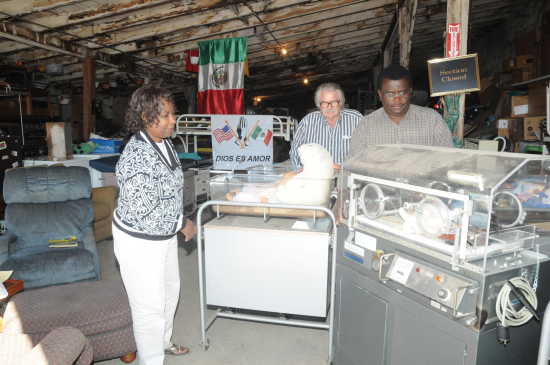Fort Scott's Kenyan connection

Local humanitarian Charles Lifer is working diligently with Simon and Margaret Muhota from Kenya, Africa to make a difference in the lives of many Kenyan residents.
For some residents in Kenya, receiving much needed medical attention is too costly and often an unattainable necessity, the Muhotas said.
The Muhotas currently operate a scant clinic in a ghetto near Nairobi, Kenya. Though the clinic is inadequate to meet the needs of the residents there, it is a ministry to those who cannot afford help at the bigger hospitals, according to the Muhotas.
According to Lifer, the clinic consist of two small rooms, an examining room and a lab. Since there is no doctor to help in the clinic, a nurse acts as a doctor tending to the needs of the people who live in the area. The lab is the room in which various testings take place, Lifer said.
"The other room is the lab where a fellow does the testing -- blood sugar, pregnancy, blood pressure, blood types -- but most importantly HIV/AIDS, yellow fever, typhus and malaria," Lifer said. "The lab technician has a microscope and a few medications from the shelf of his pharmacy. The medications are donated by Christians, and the entire pharmacy would fit in a small suitcase."
The clinic is too small to have a waiting room for people who need medical attention. These people must wait at a picnic table in the clinic's yard, according to Lifer. For some Kenyan residents, a lack of funds keeps them from seeking medical help until they are in a desperate situation, the Muhotas said. Sometimes women who are in labor come to the clinic when it is time to deliver their babies. Since the clinic is not equipped to handle the complications which could arise during childbirth, Margaret said she advises them to go to the big hospital. However most of them cannot afford to go to the hospital.
"Women come to deliver babies at the clinic," Margaret said. "We tell them to go to the big hospital, but they can't afford it."
In addition, many of the women have no transportation to the big hospital. Because of this, the Muhotas said they have to help many of the women give birth. In complicated cases, the Muhotas said they must find transportation to get the women to the hospital.
"The women will say, 'I don't have money to go to the big hospital. I'm in labor," Margaret said. "You have to deliver the baby because if the baby is coming you can't just say, 'wait.'"
According to Lifer, who operates a non-government 501 C 3 charity, after distributing medical supplies to Kenya in 1991, he decided he wanted to do more to help the people who lived there. Lifer is currently constructing a maternity hospital and has accumulated the necessary instruments to equip the hospital.
"The completed building will contain a nurse station, waiting room, labor room, delivery room, two nurseries for the newborn -- one regular babies and one HIV babies -- and a bathroom," Lifer said. "The hospital will complement the existing nurse/doctor room and the lab and will be a complete working maternity hospital."
The Muhotas said Lifer's maternity hospital project will enable them to deliver more babies and handle more complicated medical situations.
"Before the maternity clinic, we would have to transfer patients with complications to the big hospital, but with the new clinic, we will be able to handle more," the Muhotas said. "This project will meet a definite need."
Although construction of the new hospital has already started and equipment has been obtained, Lifer said he lacks the funds to finish building the hospital and needs money to ship the equipment to Kenya.
"I have nearly exhausted my funds," Lifer said. "Twenty thousand dollars is needed to complete the building... $8,000 is needed to ship the equipment to Kenya. I still have available $2,000 which I will donate to these expenses."
The Muhotas said they not only need funds to finish the construction of the hospital and transport the equipment to Kenya, but they also need money to purchase an ambulance which would be used to transport patients to the hospital in Nairobi should complications arise.
"Funds are lacking," Simon said. "We need to transport this equipment. America has been blessed. They've helped get this equipment, but we need to ship it."
For more information or to make a monetary donation, contact Lifer at (620) 223-4444.
